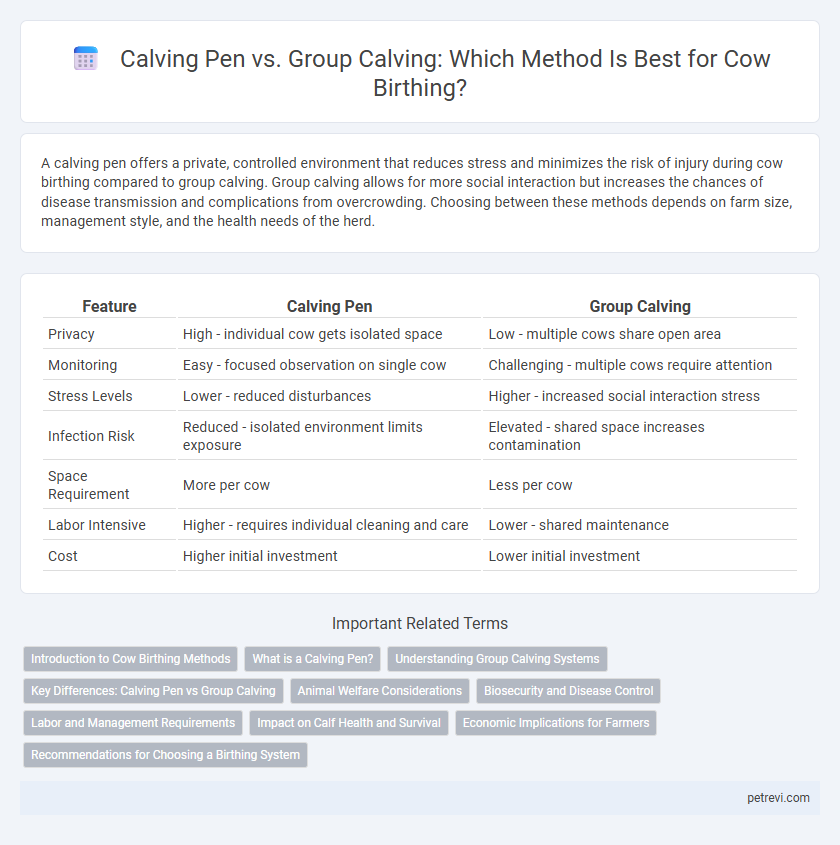A calving pen offers a private, controlled environment that reduces stress and minimizes the risk of injury during cow birthing compared to group calving. Group calving allows for more social interaction but increases the chances of disease transmission and complications from overcrowding. Choosing between these methods depends on farm size, management style, and the health needs of the herd.
Table of Comparison
| Feature | Calving Pen | Group Calving |
|---|---|---|
| Privacy | High - individual cow gets isolated space | Low - multiple cows share open area |
| Monitoring | Easy - focused observation on single cow | Challenging - multiple cows require attention |
| Stress Levels | Lower - reduced disturbances | Higher - increased social interaction stress |
| Infection Risk | Reduced - isolated environment limits exposure | Elevated - shared space increases contamination |
| Space Requirement | More per cow | Less per cow |
| Labor Intensive | Higher - requires individual cleaning and care | Lower - shared maintenance |
| Cost | Higher initial investment | Lower initial investment |
Introduction to Cow Birthing Methods
Calving pens provide a controlled, private environment that reduces stress and allows close monitoring of individual cows during birth. Group calving systems promote social interaction and natural behaviors but require careful management to minimize risks of injury and disease transmission. Understanding the benefits and challenges of each method is crucial for optimizing cow welfare and successful calving outcomes.
What is a Calving Pen?
A calving pen is a small, individual enclosure designed to provide a clean, safe, and comfortable space for a cow to give birth, minimizing stress and the risk of infection. It is typically used to isolate the cow during labor, allowing for close monitoring and immediate assistance if complications arise. Calving pens enhance calf survival rates by offering controlled conditions compared to group calving systems where multiple cows calve together.
Understanding Group Calving Systems
Group calving systems enhance cow birthing efficiency by housing multiple cows simultaneously, promoting natural social behaviors and reducing individual stress compared to isolated calving pens. These systems require careful monitoring to ensure timely assistance during difficult births while minimizing disease transmission through proper sanitation and space management. Understanding group dynamics and optimal pen design is crucial for improving calf survival rates and overall herd health in group calving environments.
Key Differences: Calving Pen vs Group Calving
Calving pens provide individual, enclosed spaces that allow for close monitoring and reduce the risk of disease transmission during cow birthing. Group calving systems enable cows to birth collectively in a shared environment, promoting natural behavior but increasing the challenge of identifying and assisting individual cows promptly. Choosing between calving pens and group calving depends on factors such as labor availability, herd size, and the level of management control desired.
Animal Welfare Considerations
Individual calving pens provide increased privacy and reduce stress for cows during birthing, lowering the risk of injury and disease transmission compared to group calving systems. Group calving promotes social interaction but can lead to increased competition and disturbance, potentially causing premature calving or neglect. Optimal animal welfare is achieved by balancing the benefits of individual space with appropriate social environments and close monitoring to ensure timely assistance.
Biosecurity and Disease Control
Calving pens offer superior biosecurity and disease control by isolating cows during birthing, reducing cross-contamination risks commonly found in group calving environments. Individual pens allow for targeted monitoring and immediate intervention, minimizing the spread of pathogens such as mastitis and Johne's disease. Group calving increases exposure to infectious agents due to shared bedding and close contact, making biosecurity management more complex and less effective.
Labor and Management Requirements
Calving pens offer individual monitoring, allowing timely intervention during labor and reducing stress for both cow and calf, but require more labor and space per animal. Group calving systems facilitate efficient use of resources and social behavior among cows but demand increased vigilance to identify cows in labor and prevent disturbances. Effective management in either system hinges on balancing close observation with minimal disruption to optimize birthing outcomes.
Impact on Calf Health and Survival
Calving pens provide a controlled environment that reduces calf exposure to pathogens, resulting in lower incidences of diseases such as scours and respiratory infections, thereby enhancing calf health and survival rates. Group calving areas increase the risk of calf morbidity due to higher pathogen loads and calf competition, which can lead to injuries and stress. Optimizing birthing strategies by using individual calving pens improves calf immunity and early bonding, crucial factors that positively influence neonatal survival.
Economic Implications for Farmers
Individual calving pens reduce disease transmission risks and enable precise monitoring, minimizing calf mortality and veterinary costs, but require higher labor and space investments. Group calving systems lower infrastructure costs and allow efficient use of space yet increase the likelihood of disease spread and calf competition, potentially elevating medical expenses and reducing calf survival rates. Farmers must balance these economic trade-offs, considering herd size, labor availability, and disease management strategies to optimize profitability.
Recommendations for Choosing a Birthing System
Choosing a birthing system for cows depends on herd size, management style, and facility design, with calving pens offering individual monitoring and reduced disease transmission, ideal for small to medium herds. Group calving systems provide social interaction and enable efficient labor with larger herds but require rigorous health protocols to minimize infection risks. Prioritize ease of access, cow comfort, and staff availability to ensure a successful calving process and reduce calf mortality.
Calving Pen vs Group Calving for Cow Birthing Infographic

 petrevi.com
petrevi.com